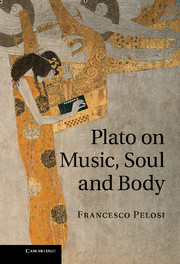4 - Music in the body and soul
Published online by Cambridge University Press: 05 November 2014
Summary
If there is no doubt that the break-up of sound is the point ‘where everything ought to arrive’, (530e6) for the interlocutors of the Republic, it is not necessarily Plato's last word on music. I would like to consider taking a different route through the dialogues (in particular the Republic and the Timaeus), following sonority and endeavouring to define the features of the presence of music in the body and soul.
In the first part of the chapter, I will deal with the passages in which Plato treats the acoustic phenomena and their perception. Firstly, we will consider the literary aspect, which is also important when highlighting the attention that Plato dedicates to the dimensions of sound and hearing. Then we will tackle the analysis of two passages in the Timaeus that are fundamental to Plato's treatment of the reception of musical phenomena, but which are relatively problematic. We will evaluate these passages in relation to the theories of perception in the Timaeus and the ancient theories of music and acoustics.
Following on, in the second half of the chapter I will concentrate on the parts in which the psychē and the correct functioning of the psychē are described in musical and harmonic terms. Socrates rejects a theory of soul-harmony in the Phaedo, but we shall see that, through the dialogues, Plato retrieves and re-elaborates the idea of a harmonic order of the soul as he moves from the Republic to the Timaeus.
- Type
- Chapter
- Information
- Plato on Music, Soul and Body , pp. 152 - 195Publisher: Cambridge University PressPrint publication year: 2010



